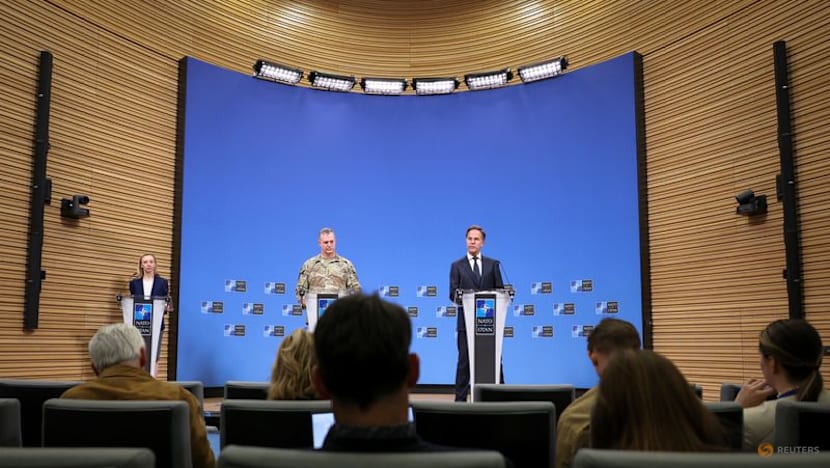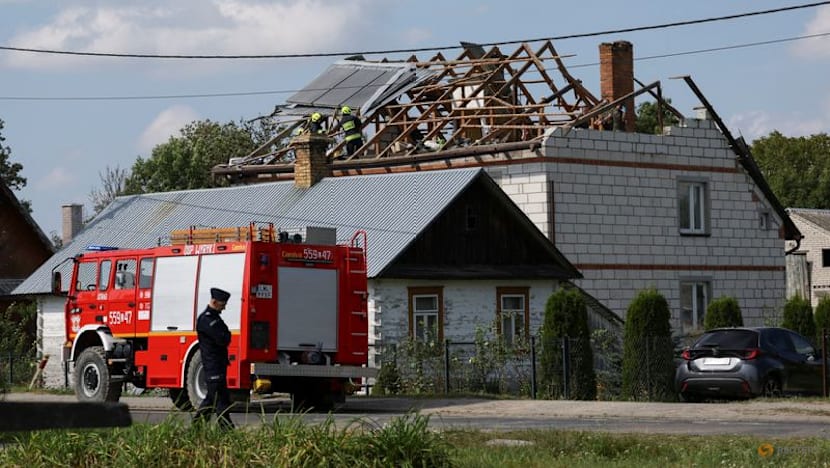NATO to beef up defence of Europe's eastern flank after Poland shot down drones
Warsaw has portrayed the drone incursions as an attempt by Russia to test the capabilities of Poland and NATO to respond.

NATO Secretary General Mark Rutte and Supreme Allied Commander Europe Alexus G Grynkewich attend a joint press conference at the Alliance headquarters in Brussels, Belgium Sep 12, 2025. (Photo: REUTERS/Omar Havana)
BRUSSELS/WARSAW/UNITED NATIONS: NATO announced plans to beef up the defence of Europe's eastern flank on Friday (Sep 12), two days after Poland shot down drones that had violated its airspace in the first known action of its kind by a member of the Western alliance during Russia's war in Ukraine.
At the United Nations, the United States called the airspace violations "alarming" and vowed to "defend every inch of NATO territory," remarks that appeared aimed at assuaging Washington's NATO allies after President Donald Trump said Russia's drone incursion could have been a mistake.
Warsaw has portrayed the drone incursions as an attempt by Russia to test the capabilities of Poland and NATO to respond.
On Friday, Poland rejected Donald Trump's suggestion that the incursions could have been a mistake, a rare contradiction of the US president from one of Washington's closest European allies. Its foreign minister told Reuters Poland hoped Washington will take action to show solidarity with Warsaw.
Later on Friday, the US joined Western allies in a statement to express concern about the drone incursion and to accuse Moscow of violating international law and the founding UN Charter.
Russia said its forces had been attacking Ukraine at the time of the drone incursions and that it had not intended to hit any targets in Poland. Russia's UN Ambassador Vassily Nebenzia said the maximum range of the drones used did not exceed 700 km "which makes it physically impossible for them to have reached Polish territory."
NATO Secretary General Mark Rutte called the incursions "reckless and unacceptable."
"We can't have Russian drones entering allied airspace," he told a press conference announcing operation "Eastern Sentry."
NUMBER OF ALLIES TO JOIN MISSION
NATO's top military official, Supreme Allied Commander Europe Alexus Grynkewich, a US Air Force general, said it was a flexible operation to bolster defences along NATO's entire eastern flank, which stretches from the Baltic states in the north to Romania and Bulgaria in the south.
Grynkewich said "Poland and citizens from across the alliance should be assured by our rapid response earlier this week and our significant announcement here today."
The mission, which begins on Friday evening, will involve a range of assets integrating air and ground bases. NATO already has substantial forces in eastern Europe, including thousands of troops. It did not specify how many additional troops would be involved in the new operation.
Rutte said allies, including Denmark, France, Britain, and Germany, have committed to the mission with others set to join. He said NATO was still assessing the possible intent behind the Russian incursion.
NATO's announcement detailed a modest number of additional military assets - including two F-16 fighter jets and a frigate from Denmark, three Rafale fighter jets from France, and four Eurofighter jets from Germany. Spain said it would provide air assets and Britain said it would detail its contribution soon.
Trump said in an interview with Fox News on Friday that his patience with Russian President Vladimir Putin was "sort of running out and running out fast", but stopped short of threatening new sanctions over the war.
Trump has repeatedly set deadlines for Moscow to agree a ceasefire or face new sanctions, only to row back.
Germany said it had extended air policing over Poland and and it and France summoned the Russian ambassadors to their countries over the drone incident.
QUESTIONS ABOUT EUROPEAN DEFENCES
For Polish leaders to directly contradict Trump is almost unheard of and a sign of Europe's alarm at the US president's willingness to give weight to Moscow's account.
This week's incident has raised questions about NATO's ability to respond to the sort of mass drone attacks - often involving hundreds of unmanned aerial vehicles - that have been a feature of the war in Ukraine following Russia's 2022 invasion.

A subsidiary of Russian nuclear corporation Rosatom said on Friday that a Ukrainian drone attacked one of the buildings of the Smolensk nuclear power station, but it was downed and no damage or casualties were reported.
European leaders say the incident in Poland again shows Moscow has no interest in a peace deal in Ukraine, weeks after Trump hosted Putin in Alaska and dropped a demand that Russia accept an immediate ceasefire.
European officials have been in Washington this week hoping to coordinate sanctions on Russia with the US administration. Announcing such sanctions in tandem was previously standard practice but has not taken place since Trump returned to office.
Kremlin spokesman Dmitry Peskov said on Friday peace negotiations were on pause and that "the Europeans are hindering this" peace process.
Ukrainian officials said US special envoy Keith Kellogg and national security advisers from Britain, Germany, France and Italy were in Kyiv. President Volodymyr Zelenskyy said many details on security guarantees for Ukraine were already on paper, and that foreign troops on the ground would signal political support for Kyiv.
Russia and its close ally Belarus began a long-planned joint military exercise on Friday involving drills in both countries and in the Baltic and Barents seas.
Dismissing concerns abroad about the exercise, Peskov said Western European countries were suffering "emotional overload" and that Russia did not pose a threat to them.















